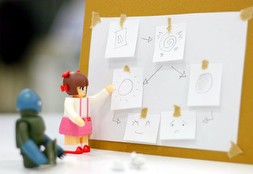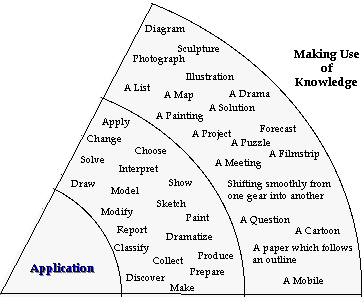When I first followed
Abject Learning's post to an
example of multimedia feedback (presumably a screencast of a journalism teacher's response to a student's article) I was immediately both impressed and horrified.
Why horrified? I'm still not sure... part of it has to do with the passivity of the experience - and the fact that there are no user controls. As
M.C. Morgan commented,
...it certainly makes the student a passive receiver of the message: there’s no room in a screencast for dialogue. You can’t even change the channel.
But I don't think that's the whole reason for my reaction, since there's not a heck of a lot of room for dialogue in a teacher's handwritten comments on the page, either.
As a teacher, targeted feedback is a huge issue for me. I spend a lot of time providing detailed feedback to students - particularly in my online classes - and it certainly would be easier to do some of it verbally rather than having to write it all out. But something about this screencast just doesn't sit right with me.
It's funny... I started off as a journalist - in fact, I wrote my very first article for a local newspaper while I was still in high school - and detailed, often harsh, feedback was definitely the norm. That first article I wrote in 9th grade was positively
shredded by the editor, but that was nothing compared with the going-over my articles got by the three editors who reviewed my work when I was a staff writer at a newspaper.
I spent a lot of time in those days writing and rewriting the same damn article (on a typewriter, not a computer), desperately trying to get it approved by the afternoon deadline... a process presumably designed to make those who survive it into better, faster writers (and typists) - and to give them a pretty thick skin.
When I first joined the staff, I'd get to meet one-on-one with each editor, who would calmly explain what was wrong with nearly every sentence I'd written - much like the journalism teacher in the screencast. (After a while, all I'd get was the butchered article itself.) Busy nursing my own bruised ego, I never really thought about what it was like on the other side of the editor's desk... until I became a managing editor myself.
The first time I reduced a writer to tears with what I thought was
gentle criticism, I gained a whole new respect for those editors - and for the very fine line they had to walk in tearing apart the article without tearing apart the writer. I also realized how much harder it is for writers to avoid feeling personally attacked when they have to *hear* the criticism rather than to read it.
Maybe this is what I'm responding to in this screencast. In some ways, it seems like the worst of both worlds.... There's a certain amount of distance in a written critique that seems to be lacking in this screencast - and the fact that the interaction doesn't allow the writer any kind of response makes it seem somewhat brutal to me.

 PingMag presents an easy-to-understand guide to the basic website development process - each step illustrated with photos of little plastic figurines.
PingMag presents an easy-to-understand guide to the basic website development process - each step illustrated with photos of little plastic figurines.




 Great resource from St. Edward's University... This
Great resource from St. Edward's University... This 